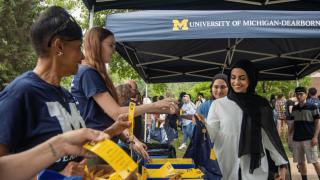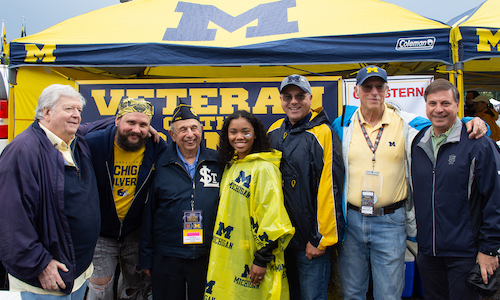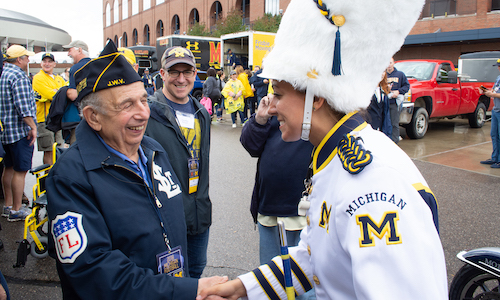Their tailgate has gotten more elaborate each year — with an energy now that almost rivals the on-field standing ovation the Veteran of the Game gets between the third and fourth quarters. The marching band has made a habit of dropping by to serenade the week’s honorary veteran — complete with a hug from the drum major. And over the past few seasons, there have been plenty of noteworthy veterans and memorable moments. Guy Stern, one of the legendary Richie Boys — German Jews who escaped the Nazis and worked as American interrogators — was a featured veteran this fall. Other times, Christian said, it’s been a thrill just to watch two men, prior strangers but survivors of same World War II action, simply hold hands, all the communication happening in silence.
As the event grew, Christian and Bernard — who are both now in their 70s — also realized they could use a little help putting it on. So they approached student veteran organizations at a few nearby universities and got an enthusiastic response from UM-Dearborn. Since then, every Friday afternoon on home weekends, about a dozen or so UM-Dearborn student veterans show up to help them load up the coolers, grills and banners into a rented U-Haul; and then help offload everything and run the show on game day.
Alex Chambers, a mechanical engineering senior and former president of UM-Dearborn’s Student Veterans Association, is one of many who have been regulars at the veterans tailgate. The eight-year Army veteran, who was deployed for 18 months in Iraq, said it can be a struggle to bring young veterans together — in part, because they simply aren’t turning up at traditional venues like the American Legion or VFW.
“I think younger vets run the risk of being more isolated when they come home,” she explained. “I lost friends because they got so used to not having me around. For us, time stops; for everyone else it just continues. So to see some of the younger vets sharing stories with the older vets — and to have families come by to spend time with us and share their appreciation — all that helps get you back in a good place.”
Chambers said connecting with other veterans, young and old, has also helped her personally deal with some of the psychological trauma that follows you after a combat experience. Particularly when you deploy, she says, there’s a major shift in mindset — the one that comes from preparing yourself for the moment when you may have to take another person's life. “The thing is, even if you don’t ever have to do it, you carry a lot of guilt,” she said. “So to be able to talk about that with other people who’ve had similar experiences, it’s like it helps you realize you’re not a bad person.”
Creating a place for those kinds of experiences wasn’t necessarily the mission when Christian and Bernard somewhat accidentally started their new tailgate tradition. But it arguably is now. Christian sees connecting generations of veterans as crucial to helping those who have served in more recent wars wade through the challenges of life after combat. It’s about providing a tangible human example, he says; so they can talk with and stand next to someone who also survived an incredibly difficult — often difficult to explain — experience and see that they went on to have families and careers and fulfilling lives.
“It’s really hard to describe the bonding that happens between the student veterans and the older veterans. It’s electric and instantaneous. It’s good for the older guys, who find themselves suddenly sharing stories they’ve never told anyone before. It’s good for our students, who are dealing with their own life-after-combat issues. And it’s good for the rest of us who get to witness it.”






